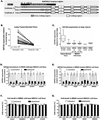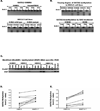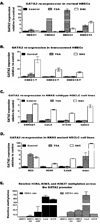GATA2 is epigenetically repressed in human and mouse lung tumors and is not requisite for survival of KRAS mutant lung cancer
- PMID: 24807155
- PMCID: PMC4132640
- DOI: 10.1097/JTO.0000000000000165
GATA2 is epigenetically repressed in human and mouse lung tumors and is not requisite for survival of KRAS mutant lung cancer
Abstract
Introduction: GATA2 was recently described as a critical survival factor and therapeutic target for KRAS mutant non-small-cell lung cancer (NSCLC). However, whether this role is affected by epigenetic repression of GATA2 in lung cancer is unclear.
Methods: GATA2 expression and promoter CpG island methylation were evaluated using human and mouse NSCLC cell lines and tumor-normal pairs. In vitro assays were used to study GATA2 repression on cell survival and during tobacco carcinogen-induced transformation.
Results: GATA2 expression in KRAS wild-type (n = 15) and mutant (n = 10) NSCLC cell lines and primary lung tumors (n = 24) was significantly lower, 1.3- to 33.6-fold (p = 2.2 × 10(9)), compared with corresponding normal lung. GATA2 promoter was unmethylated in normal lung (0 of 10) but frequently methylated in lung tumors (96%, 159 of 165) and NSCLC cell lines (97%, 30 of 31). This highly prevalent aberrant methylation was independently validated using The Cancer Genome Atlas data for 369 NSCLC tumor-normal pairs. In vitro studies using an established carcinogen-induced premalignancy model revealed that GATA2 expression was initially repressed by chromatin remodeling followed by cytosine methylation during transformation. Similarly, expression of GATA2 in NNK-induced mouse lung tumors (n = 6) and cell lines (n = 5) was fivefold and 100-fold lower, respectively, than normal mouse lung. Finally, siRNA-mediated knockdown of GATA2 in KRAS mutant (human [n = 4] and murine [n = 5]) and wild-type (human [n = 4]) NSCLC cell lines showed that further reduction of expression (up to 95%) does not induce cell death.
Conclusion: GATA2 is epigenetically repressed in human and mouse lung tumors and its further inhibition is not a valid therapeutic strategy for KRAS mutant lung cancer.
Figures



Similar articles
-
The GATA2 transcriptional network is requisite for RAS oncogene-driven non-small cell lung cancer.Cell. 2012 Apr 27;149(3):642-55. doi: 10.1016/j.cell.2012.02.059. Cell. 2012. PMID: 22541434
-
Oncogenic KRAS-induced epiregulin overexpression contributes to aggressive phenotype and is a promising therapeutic target in non-small-cell lung cancer.Oncogene. 2013 Aug 22;32(34):4034-42. doi: 10.1038/onc.2012.402. Epub 2012 Sep 10. Oncogene. 2013. PMID: 22964644 Free PMC article.
-
Epigenetic inactivation of the RAS-effector gene RASSF2 in lung cancers.Int J Oncol. 2007 Jul;31(1):169-73. Int J Oncol. 2007. PMID: 17549418
-
The genetics and biology of KRAS in lung cancer.Chin J Cancer. 2013 Feb;32(2):63-70. doi: 10.5732/cjc.012.10098. Epub 2012 Jul 2. Chin J Cancer. 2013. PMID: 22776234 Free PMC article. Review.
-
KRAS mutations in non-small cell lung cancer.Proc Am Thorac Soc. 2009 Apr 15;6(2):201-5. doi: 10.1513/pats.200809-107LC. Proc Am Thorac Soc. 2009. PMID: 19349489 Review.
Cited by
-
Genome-wide analyses of long noncoding RNA expression profiles in lung adenocarcinoma.Sci Rep. 2017 Nov 10;7(1):15331. doi: 10.1038/s41598-017-15712-y. Sci Rep. 2017. PMID: 29127420 Free PMC article. Clinical Trial.
-
Identification of lysosomal genes associated with prognosis in lung adenocarcinoma.Transl Lung Cancer Res. 2023 Jul 31;12(7):1477-1495. doi: 10.21037/tlcr-23-14. Epub 2023 Jul 18. Transl Lung Cancer Res. 2023. PMID: 37577321 Free PMC article.
-
Integration of multiple biological contexts reveals principles of synthetic lethality that affect reproducibility.Nat Commun. 2020 May 12;11(1):2375. doi: 10.1038/s41467-020-16078-y. Nat Commun. 2020. PMID: 32398776 Free PMC article.
-
ANK1 Methylation regulates expression of MicroRNA-486-5p and discriminates lung tumors by histology and smoking status.Cancer Lett. 2017 Dec 1;410:191-200. doi: 10.1016/j.canlet.2017.09.038. Epub 2017 Sep 29. Cancer Lett. 2017. PMID: 28965852 Free PMC article.
-
Construction of the optimization prognostic model based on differentially expressed immune genes of lung adenocarcinoma.BMC Cancer. 2021 Mar 1;21(1):213. doi: 10.1186/s12885-021-07911-8. BMC Cancer. 2021. PMID: 33648465 Free PMC article.
References
-
- Jemal A, Bray F, Center MM, et al. Global cancer statistics. CA Cancer J Clin. 2011;61:69–90. - PubMed
-
- Dominioni L, Imperatori A, Rovera F, et al. Stage I nonsmall cell lung carcinoma: analysis of survival and implications for screening. Cancer. 2000;89:2334–2344. - PubMed
-
- Pao W, Girard N. New driver mutations in non-small-cell lung cancer. Lancet Oncol. 2011;12:175–180. - PubMed
-
- Inoue A, Kobayashi K, Usui K, et al. First-line gefitinib for patients with advanced non-small-cell lung cancer harboring epidermal growth factor receptor mutations without indication for chemotherapy. J Clin Oncol. 2009;27:1394–1400. - PubMed
-
- Inoue A, Suzuki T, Fukuhara T, et al. Prospective phase II study of gefitinib for chemotherapy-naive patients with advanced non-small-cell lung cancer with epidermal growth factor receptor gene mutations. J Clin Oncol. 2006;24:3340–3346. - PubMed
Publication types
MeSH terms
Substances
Grants and funding
LinkOut - more resources
Full Text Sources
Other Literature Sources
Medical
Miscellaneous

